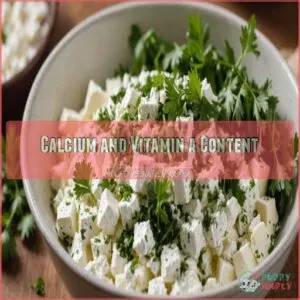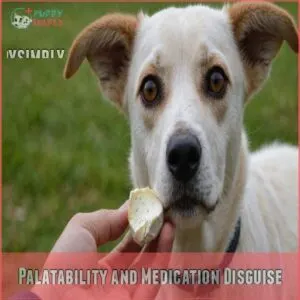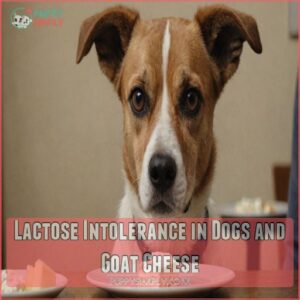This site is supported by our readers. We may earn a commission, at no cost to you, if you purchase through links.
 Can dogs eat goat cheese? Yes, but in moderation!
Can dogs eat goat cheese? Yes, but in moderation!
A tiny bit won’t hurt most dogs; it’s actually got some protein.
Think of it as a delicious, albeit occasional, treat.
However, too much goat cheese can upset their tummies, especially if they’re lactose intolerant.
It’s also higher in fat than you might think.
So, small amounts are key, and always watch your pup for any digestive issues.
My own dog, a goofy golden retriever, once sneakily ate a whole wheel (don’t ask!), and let’s just say it wasn’t pretty!
Want to know more about safe cheese choices for your furry friend? Read on to discover the best and worst options for canine consumption.
Table Of Contents
- Key Takeaways
- Can Dogs Eat Goat Cheese?
- Nutritional Value of Goat Cheese
- Risks of Feeding Goat Cheese to Dogs
- Dangers of Raw Goat Cheese for Dogs
- Safe Ways to Feed Goat Cheese to Dogs
- Lactose Intolerance in Dogs and Goat Cheese
- When to Avoid Giving Goat Cheese to Dogs
- Importance of Consulting a Veterinarian
- Frequently Asked Questions (FAQs)
- Can a dog eat too much goat cheese?
- Does goat cheese have lactose and is it appropriate for people with high lactose intolerance?
- Can dogs eat old cheese?
- Can dogs eat cheddar cheese?
- Can dogs eat goat milk?
- Can dogs eat cottage cheese?
- What type of cheese can dogs eat?
- Can dogs have blueberry goat cheese?
- Is goat safe for dogs?
- Can dogs have goat feta?
- How does goat cheese flavor affect dogs?
- Can puppies safely consume goat cheese?
- What breeds should avoid goat cheese?
- Is goat cheese better than cow cheese?
- How much goat cheese is too much?
- Conclusion
Key Takeaways
- You can give your dog goat cheese as an occasional treat, but moderation is key to avoid digestive issues and weight gain.
- Watch out for flavored goat cheeses that might contain harmful ingredients like garlic or onions, which are toxic to dogs.
- Goat cheese is a source of nutrients like calcium and vitamin A, but consult your vet to ensure it’s suitable for your dog’s diet.
- Always monitor your dog’s reaction to goat cheese and be cautious if your dog shows signs of lactose intolerance or has a sensitive stomach, which can be a sign of a food allergy.
Can Dogs Eat Goat Cheese?
You’re probably wondering if sharing a piece of goat cheese with your furry friend is safe—it’s a question many pet parents face.
While goat cheese can be a tasty treat for some dogs, packed with nutrients like calcium and vitamin A, it also carries risks like digestive upset and weight gain, so it’s important to be cautious.
Benefits of Goat Cheese for Dogs
Goat cheese can be a delightful treat for your dog, adding variety and nutrition to their diet. Its high calcium content supports bone health, while the delightful flavor can appeal to picky eaters. Here’s why you might consider it:
- Calcium Booster: Essential for strong bones and teeth.
- Picky Eater Nirvana: Entices even the most finicky pups.
- Sneaky Medicine Hider: Masks those pesky pill flavors effortlessly.
Remember, just like cottage cheese which can be a great source of protein when paired with fruits like pineapple in moderation as seen in cottage cheese and pineapple, feeding goat cheese in moderation makes sure your dog enjoys these benefits safely. Just picture your dog enjoying this delicious snack, their tail wagging in approval!
Risks of Goat Cheese for Dogs
Your pup’s love for goat cheese mightn’t be as harmless as it seems. High-fat content raises pancreatitis risk, potentially leading to serious health issues. Weight gain‘s another concern, especially if your canine companion has been indulging in cheesy treats too often. Lactose intolerance can cause digestive problems, with symptoms like diarrhea or vomiting—a surefire way to ruin both your days! Beware of flavored varieties; harmful ingredients like garlic and onions could lurk. While they’re savoring the charm of cheese, you’re left to worry about the risks.
| Risk | Potential Effects | Prevention Tips |
|---|---|---|
| Pancreatitis | Abdominal pain, vomiting | Limit cheese intake |
| Weight Gain | Obesity, health decline | Monitor portions |
| Lactose Intolerance | Diarrhea, digestive upset | Check tolerance |
| Harmful Ingredients | Toxic reactions, serious illness | Read labels carefully |
Nutritional Value of Goat Cheese
Goat cheese packs a punch with its nearly equal amounts of protein and fat, making it a tasty treat if you’re looking to spoil your pup.
Goat cheese is a gourmet snack with calcium and vitamin A content.
Calories and Protein Content
Seventy-five calories per ounce make goat cheese a flavorful yet calorie-dense treat for your furry friend.
Its equal parts protein and fat play a role in building muscles but can also pack on pounds quickly.
Here’s what to keep in mind:
- Serving size matters!
- Use sparingly—treats, not meals.
- Monitor your dog’s weight.
- Consult your vet for diet advice.
Calcium and Vitamin a Content
So, you’ve learned about the calories and protein in goat cheese.
Now, let’s look at its other nutritional goodies!
Goat cheese is a decent source of calcium and vitamin A, both important for your pup’s health.
Check out this handy table:
| Nutrient | Amount (per ounce) | Benefit for Dogs |
|---|---|---|
| Calcium | Varies | Strong bones and teeth |
| Vitamin A | Varies | Good vision and immune system |
Remember, moderation is key!
Essential Fatty Acids in Goat Cheese
Imagine giving your dog a superfood snack, like goat cheese, that’s packed with essential fatty acids.
These nutrients are pivotal for dog health, supporting shiny coats and strong immune systems.
While adding a tasty twist to their meal, you might think, "Can dogs eat goat cheese safely?"
Yes, but keep an eye on dietary needs, as it may not suit every pup.
Palatability and Medication Disguise
For picky pups, goat cheese works wonders in taste masking.
You can hide medication in this palatable treat and watch your dog’s hesitation melt away.
It’s a nifty trick that boosts medication compliance.
Plus, during training, a small cheese reward can motivate.
Always follow veterinarian advice to make sure you’re giving cheese safely and in appropriate amounts.
Low Sugar Content
While cheese might be a lifesaver for sneaky pill delivery, its low sugar content makes goat cheese a fantastic choice for health-conscious pup parents.
If you’re juggling pet nutrition advice, diabetes, or a sugar-free diet, this cheese won’t tip the scales for dog weight management.
Considering your dog’s sensitive stomach can be caused by food intolerances, such as specific protein sources, fiber sources, or excessive fat content, common causes of sensitive stomachs. Keep those pet food allergies and dog digestive issues at bay with this healthy alternative.
Risks of Feeding Goat Cheese to Dogs
When you’re considering goat cheese as a treat for your dog, be mindful of the potential risks lurking in its deliciousness.
High in fat and calories, goat cheese can lead to weight gain,
and flavored varieties may contain harmful ingredients like onions or garlic that can upset your pup’s tummy.
High Fat and Calorie Content
Goat cheese can look tempting, but keep an eye on its high fat and calorie content.
Too much can lead to obesity risk and even pancreatitis in dogs.
Stay on top of things with:
- Weight management: Keep treats in check.
- Calorie counting: Small portions go a long way.
- Treat moderation: Use it sparingly, just like that rich dessert you sneak occasionally!
Flavored Goat Cheeses and Harmful Ingredients
After worrying about cheese’s high calorie impact, focus on flavored varieties, often hiding harmful ingredients.
Your dog might love the taste, but those flavor additives can pose serious risks.
Onion toxicity or garlic dangers can spell trouble for your furry friend.
Spice risks linger too—couldn’t they do without those spicy surprises?
Stick with safe cheeses for dogs, ensuring pet care tips align with dog health and wellness.
Lactose Intolerance and Digestive Issues
Many dogs are lactose intolerant, so goat cheese can cause tummy troubles.
Symptoms like diarrhea or vomiting might pop up if your pup’s sensitive to dairy.
Similar to cream cheese, as a dairy allergen, goat cheese may not agree with all dogs, and it’s important to check lactose intolerance signs.
If you notice these digestive upset symptoms, you should switch to lactose-free treats or explore goat cheese alternatives.
Think dairy-free diets and dog cheese alternatives—plenty of yummy options exist!
Cottage cheese is sometimes better tolerated than goat cheese.
Remember, always check with your vet before making big dietary changes for your furry friend.
They can help you find the best cheese for dogs, or offer healthy cheese for dogs that are safe and delicious.
Dangers of Raw Goat Cheese for Dogs
Regarding raw goat cheese, your furry friend could be at risk of foodborne illnesses like Listeria or Salmonella, which aren’t fun for anyone.
Although your dog might drool over the cheese’s creamy goodness, sticking to pasteurized options is the safest bet, as these eliminate harmful pathogens that could cause serious health issues.
Harmful Pathogens and Zoonotic Diseases
Raw goat cheese might seem like a natural treat, but it carries risks you can’t ignore.
Harmful pathogens like Listeria, Salmonella, and E. coli could lead to serious health issues for your pooch.
Picture dealing with a foodborne illness outbreak—it’s no picnic!
While cheddar, mozzarella, or feta can be tempting alternatives, focus on foodborne illness prevention to keep your furry friend safe.
Pasteurization and Safety
Imagine this: your trusty dog could fall ill just from eating raw goat cheese.
Without the pasteurization process, harmful pathogens like Salmonella and E. coli might crash the party, causing foodborne illnesses.
Certain cheeses, like American cheese, also have risks associated with them, including pancreatitis in dogs and contributing to weight gain due to their high-fat content American cheese risks.
Stick to safe cheese options like cheddar, cottage, or mozzarella for dogs—each one a sure bet.
No need for Fido to go on an unexpected vet adventure due to raw milk risks!
FDA Recommendations for Raw Milk Products
You’re wondering if raw goat cheese is safe for dogs.
The FDA’s stance is clear: raw milk products can harbor harmful bacteria.
Think about it: those pathogens can cause some nasty foodborne illnesses.
So consider:
- FDA regulations guarantee safety
- Raw milk safety matters
- Pasteurization process helps
- Keep an eye on consumer awareness
- Choose safer options like brie cheese for dogs
Safe Ways to Feed Goat Cheese to Dogs
When you decide to share goat cheese with your furry friend, start with small, plain pieces and monitor their reaction to avoid any digestive surprises.
Goat cheese that’s free from added flavors or harmful ingredients, ensuring it’s a safe treat for your dog.
Introducing Goat Cheese to Your Dog’s Diet
After understanding raw cheese’s risks, introducing goat cheese to your dog’s diet can be done safely.
Start by giving small amounts of plain goat cheese.
For safe options, consider products from websites that specialize in goat cheese dog safe alternatives, such as goat cheese dog safe products.
Choose a soft type, as it’s easier on their stomachs.
Always practice moderation and avoid flavored varieties that might contain harmful ingredients.
If uncertain, consult vet advice to make sure there are no dog allergies or intolerances lurking.
Monitoring Your Dog’s Reaction
Introducing goat cheese requires careful observation.
Watch for any unusual signs.
Here’s what to look for:
- Digestive upset (vomiting, diarrhea)
- Allergic reactions (itching, swelling)
- Food aversion (refusal to eat)
- Weight gain or behavioral changes
If you notice anything unusual, stop giving your pup goat cheese immediately and consult your vet.
It’s better to be safe than sorry!
Choosing The Right Type of Goat Cheese
When selecting goat cheese for your dog, opt for plain, pasteurized varieties.
Some cheeses can contain ingredients like garlic or herbs, which aren’t safe for dogs.
Always scrutinize the label beforehand.
| Flavor Profile | Texture Preference |
|---|---|
| Mild & Tangy | Soft & Spreadable |
| Rich & Creamy | Semi-soft |
| Nutty & Savory | Firm & Sliced |
A little humor: Dogs may find cheese irresistible—who can blame them?
Lactose Intolerance in Dogs and Goat Cheese
If your dog gives you the side-eye after nibbling on goat cheese, lactose intolerance might be the culprit.
While goat cheese has less lactose than cow’s milk cheese, some dogs still struggle to digest it, leading to tummy troubles that no one wants to deal with.
Signs and Symptoms of Lactose Intolerance
Imagining your dog wolfing down goat cheese sounds fun until lactose intolerance sneaks in like an uninvited guest.
Be on the lookout for diarrhea, vomiting, bloating, and gas, these unpleasant signals suggest that your furry friend might be having a rough time, especially since persistent diarrhea in dogs can lead to dehydration.
If you notice loss of appetite, it’s time to hit pause on that cheese treat before the symptoms spoil your dog’s day.
Testing for Lactose Intolerance
Wondering if your dog might be lactose intolerant?
Testing it’s simple and, dare I say, a bit like a doggie detective mission!
Try a homemade lactose test by giving a small amount of goat cheese.
Watch for any dairy sensitivity signs like:
- Diarrhea or an upset stomach
- Vomiting
- Excessive gas
- Loss of appetite
If your pup experiences digestive issues from certain dairy products, it may be because they are lactose intolerant and have trouble digesting the lactose in plain and Greek yogurt varieties. If symptoms appear, your pup might’ve a dog dairy allergy.
Managing Lactose Intolerance in Dogs
Testing has confirmed Fido’s lactose intolerance, so what’s next?
Consider lactose-free alternatives and a dairy-free diet.
You can also find goat cheese dog treats that are specifically formulated to be easier on sensitive tummies.
Probiotics for dogs can soothe the gut, helping ease symptoms of intolerance.
Ever thought of yogurt for dogs? It’s often better tolerated.
Observe your dog’s response to these changes, and keep the vet in the loop for personalized advice.
Remember, every dog’s different!
When to Avoid Giving Goat Cheese to Dogs
Regarding feeding your pup goat cheese, sometimes it’s best to steer clear, especially if they resemble a furry potato in size.
Dogs that are overweight, have kidney issues, or sport a tender tummy should probably stick to less cheesy options for their own good.
Overweight or Obese Dogs
So, your dog’s got a bit of a spare tire? Goat cheese’s high fat content isn’t ideal for weight management strategies.
If your pup’s already packing extra pounds, it’s best to skip the cheese.
Consider these alternatives instead:
- Regular walks and exercise routines.
- A vet-approved diet plan.
- Healthy treats in moderation.
- Plenty of belly rubs!
Vet recommendations are key for weight loss; they can create a personalized plan.
Dogs With Kidney Problems
Your dog’s delicate balance of kidney health means skipping goat cheese.
With protein restrictions, stick to their kidney diet.
Imagine cheese tempting with its creamy allure, risking issues.
Hydration needs demand focus, and this cheesy snack won’t help.
Vet recommendations often steer toward alternative foods like lean meats.
Better safe than sorry, right?
Here’s a quick glance to guide you:
| Factor | Goat Cheese | Alternative |
|---|---|---|
| Protein Content | High | Moderate |
| Hydration Impact | None | Supports Hydration |
| Vet Recommendations | Avoid | Encourage Alternatives |
Dogs With Sensitive Stomachs
If your dog has kidney issues, skipping goat cheese is wise, but what if they’ve a sensitive stomach?
Digestive issues are no fun for pups, and goat cheese might just stir the pot.
You can consider goat cheese alternatives or chat with your vet for recommendations.
Sometimes, homemade treats with probiotics can provide tasty, stomach-soothing options that even the pickiest eater will love.
Importance of Consulting a Veterinarian
Before sharing goat cheese with your furry friend, it’s wise to consult your veterinarian, as they can offer personalized advice based on your dog’s health needs.
Whether you meet face-to-face or use online services, a vet’s guidance helps you avoid any unexpected "cheesy" situations.
Expert Advice on Feeding Goat Cheese
Balancing your dog’s diet can feel like walking a tightrope, so consult a veterinarian. Here’s why it’s important:
- Goat cheese dosage: Make sure it’s safe and suitable.
- Goat cheese alternatives: Get healthier options.
- Goat cheese brands: Choose trusted labels, such as those available at best goat cheese products.
- Safe goat cheese snacks: Find perfect treats.
Professional veterinary guidance can turn wobbles into steady steps, guaranteeing your pet’s safety and happiness.
Verified Veterinary Experts
Imagine this: you’re at a crossroads, wondering if your dog should nibble on goat cheese.
Veterinary expert advice can point you in the right direction.
Don’t skimp on consulting your vet; they offer solid insights, from vet-approved treats to dog food recommendations, including guidance on balanced dog nutrition.
A simple chat can unravel complex queries, ensuring your furry friend stays safe without a hitch.
After all, it’s better to be safe than sorry.
Online Platforms for Veterinary Consultations
Have you ever wondered if your dog can safely eat goat cheese?
That’s where online vet appointments come in handy.
Using veterinary telehealth gives you peace of mind without leaving your sofa, providing expert advice on remote animal care.
Virtual pet consultations can clarify any digital pet health records you have.
It’s all about keeping your furry friend healthy and your worries in check!
Frequently Asked Questions (FAQs)
Can a dog eat too much goat cheese?
Feeding your dog too much goat cheese can cause weight gain and digestive issues like diarrhea.
Its high fat content might lead to pancreatitis.
Give goat cheese sparingly, and always check with your vet first.
Does goat cheese have lactose and is it appropriate for people with high lactose intolerance?
Goat cheese contains lactose, though less than cow’s milk cheese.
If you’re highly lactose intolerant, it may still cause trouble.
Consider trying lactose-free alternatives or enjoy it in small amounts to see how your body reacts.
Can dogs eat old cheese?
You might think about tossing your old cheese to the dog, but hold your horses!
It’s not advisable.
Old or moldy cheese can cause stomach upset, and certain molds are toxic, making it a risky treat.
Can dogs eat cheddar cheese?
Cheddar cheese can be a tasty treat for dogs in small amounts, but it’s high in fat and calories.
Always check for adverse reactions like digestive upset and consult your vet for personalized advice on cheese treats.
Can dogs eat goat milk?
Imagine milk as a gentle stream of nutrients.
Dogs can drink goat milk in moderation for its nutrients, like proteins and calcium, but watch for lactose intolerance signs.
Always consult your vet before introducing new foods.
Can dogs eat cottage cheese?
Small amounts of plain cottage cheese are generally okay, but it’s best to check with your vet first.
They can advise on portion sizes and potential tummy troubles.
Always prioritize your pup’s health!
What type of cheese can dogs eat?
Dogs can nibble on plain, low-fat cheeses like mozzarella and cottage cheese in moderation.
These options are easier on a dog’s stomach, but always check for lactose intolerance, as some dogs may get an upset tummy.
Can dogs have blueberry goat cheese?
Blueberry goat cheese might tempt your pup, but flavored cheeses often contain additives like garlic or onion, which are toxic to dogs.
It’s best to stick with small amounts of plain goat cheese and always check labels first.
Is goat safe for dogs?
It is generally safe to let your dog eat goat in moderation.
Make sure the meat is cooked, unseasoned, and boneless.
Consult your vet before introducing new foods to avoid digestive issues or allergies.
Can dogs have goat feta?
Goat feta might tempt your pup’s taste buds, but it’s best in moderation due to high fat and calorie content.
Goat feta might tempt your pup’s taste buds, but it’s best in moderation due to high fat and calorie content.
Check for harmful additives, and consult your vet before giving it as a treat.
How does goat cheese flavor affect dogs?
Just like an unexpected twist in a story, the flavor of goat cheese can delight dogs or cause trouble.
Plain cheese is generally safe in moderation, but flavored varieties might include harmful ingredients like garlic.
Always check labels.
Can puppies safely consume goat cheese?
Puppies can nibble on a little goat cheese, but you should tread carefully.
Their tummies mightn’t handle it well.
Always chat with your vet first to make sure your fluffy friend stays bouncy and healthy.
What breeds should avoid goat cheese?
Seriously, who wouldn’t want a cheesy treat? Dogs with dairy allergies or lactose intolerance should steer clear of goat cheese. It’s best to check with your vet first.
Is goat cheese better than cow cheese?
Goat cheese is often easier to digest and lower in lactose than cow cheese, making it a healthier option for some people.
Goat cheese contains more fat, so consider your dietary needs before choosing your cheesy companion.
How much goat cheese is too much?
Did you know goat cheese contains about 75 calories per ounce?
For dogs, moderation is key.
Offering a tiny piece as a treat is fine, but too much can lead to weight gain or digestive issues.
Conclusion
Regarding sharing goat cheese with your dog, remember this adage: "Everything in moderation."
Goat cheese can be a tasty treat for dogs if done right.
Just like with any treat, moderation is key to prevent tummy troubles.
Keep an eye on your pooch for any signs of lactose intolerance, like gas or diarrhea.
Always consult your vet for personalized advice.
Enjoy discovering safe ways to let your dog enjoy this cheesy delight!

















